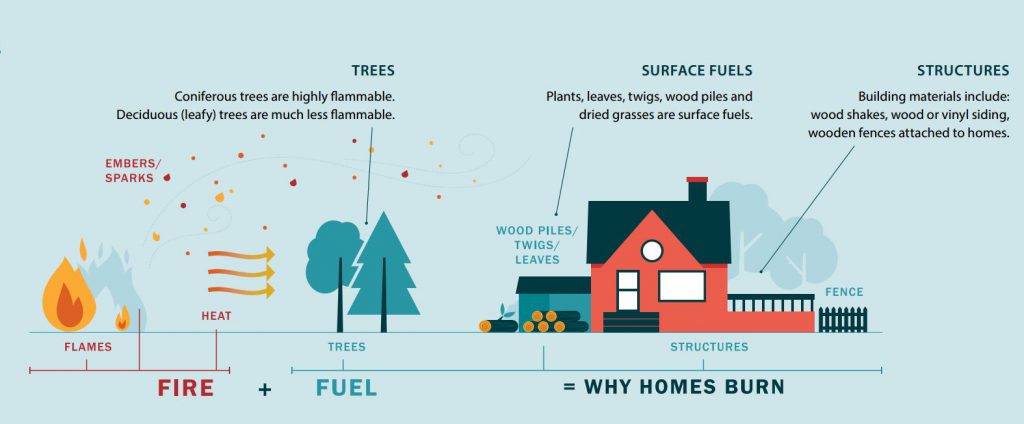Knowing how to respond in the event of a wildfire is a concern and responsibility of the entire community and it could help save your life and the lives of others as well. Human-caused fires account for just over half of all wildfires in Canada, with lightning strikes causing the majority of the remainder, according to Natural Resources Canada. Wildfire season can start as early as March 1st and can continue until October. In the last 2 years, British Colombia (B.C.) experienced record-breaking wildfire seasons. With many of the major recent wildfires occurring in B.C., Alberta, and Ontario, it can be expected that these fires will continue to affect and change Canadian summers in the coming years.
Preparing your home for a wildfire

Source: FireSmart Canada Homeowner’s Manual
- Clear the area around your home of surface fuels, which include wood piles, leaves, twigs, and dried grasses.
- Keep your family safe by developing a household plan and putting together an emergency kit (including enough non-perishable foods and water to support your family).
- Every person in your household should be able to locate where the gas, electric, and water main shut off controls are and know how to safely shut them off if ordered to by officials.
- Create an emergency phone list that each member of your household has access to. It should have at least one out-of-area contact.
- Review your home, condo or renter’s insurance policy.
- Have an up-to-date inventory list of items within your home.
- Make sure every floor and all bedrooms have smoke detectors that are up to date.
Evacuation Alerts and Orders
If an Evacuation Alert or Order is issued, it is important to know the difference between the two.
Evacuation Alert
If an Emergency Alert is ordered, be prepared to evacuate your home on very little notice. Gather important documents, several days of clothing, toiletries, and medications. Listen for further information from local emergency officials.
Evacuation Order
If an Emergency Order is issued, evacuate the affected area immediately. Make sure you are aware of any highway closures and follow the directions of local emergency officials to know which route(s) are recommended for evacuation. Let someone know where you will be going and register at a reception centre if told to do so. Do not return to your home until you’ve been advised that the Evacuation Order has been lifted.
Protect yourself from wildfire smoke
With increased wildfires comes air quality advisories that can last anywhere from a few days to multiple weeks at a time. Minimize and reduce your exposure to smoke-filled skies in order to protect your long-term health. Those with pre-existing heart and lung conditions as well as infants and seniors should take extra caution. Make sure to check for air quality advisories that are in-effect in your area before spending long periods of time outdoors or participating in vigorous outdoor activities.
Read on: Preparing Your Business for a Wildfire and What to do After a Wildfire Occurs
Read on: Most Common Causes of House Fires and How to Prevent Them
Further Resources:
Alberta Fire Bans and Restrictions
Fuse Insurance Ltd. is the evolution of the commercial insurance brokerage, and the first of its kind in Western Canada. Backed by policies from a selection of A-rated insurers, Fuse Insurance can provide coverage for businesses large and small from almost any industry. For further information or to get an online quote now, click here or call us at 1-866-387-FUSE (3873) for more details.






